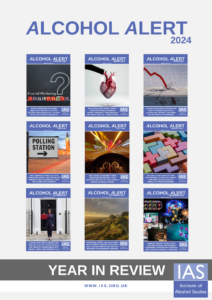In this month’s alert
There is a risk that when the word “crisis” is overused it leads to desensitisation or “crisis fatigue”, as well as feelings of hopelessness. There is also a risk that with everything labelled a crisis, policymakers may struggle to know what to prioritise and fail to address issues effectively. How many organisations will have written to the new government to say there is a crisis in healthcare, housing, immigration, our climate, education…? However (cue us falling into this trap), it is difficult to look at the shocking rise in deaths from alcohol in the UK without thinking, “This is a crisis”. A crisis implies a looming catastrophe – a subjective definition, but anyone who has lost a loved one due to alcohol in recent years alongside government inaction may well feel catastrophic loss.
Earlier this month, new figures for alcohol-specific deaths in England showed that 2023 saw the highest number of deaths for the fourth year in a row, increasing by 4.6% on the previous year and a huge 42% since 2019. These figures are much worse than either IAS or the University of Sheffield estimated in 2022 modelling studies on how pandemic drinking would increase harm. Meanwhile, as deaths continue to rise at home, many comparable countries are beginning to see a decline. So, sticking with the word crisis, what did the previous government do throughout this period of crisis? It cut alcohol duty rates four times, which will have increased the number of people who died from alcohol. It designated off-licences as ‘essential’, meaning they could remain open when pubs, bars, and restaurants were closed, fuelling an increase in home drinking. It routinely disregarded public health recommendations in favour of alcohol industry lobbying. And it left England as the only nation in the UK to not introduce – or announce plans to introduce – Minimum Unit Pricing, despite the policy saving lives in Scotland.
And so, in the midst of this crisis, what opportunities are there? There are positive noises coming from the new government regarding prevention policies. As Labour MP Dan Carden said in April this year: “If Labour succeeds in forming a government, we have an exciting opportunity to demonstrate the crucial importance of prevention policies.” While bold measures to tackle alcohol’s rising affordability were absent from the Autumn Budget, there is cause for optimism regarding the long-termism and prevention focus of the Health Mission Board, the NHS 10-Year plan, and the recommendations of Lord Darzi’s NHS review, which emphasised the urgency of addressing alcohol harm. And just this week, Public Health Minister Andrew Gwynne acknowledged: “For too long, there has been an unwillingness to lead on issues like smoking, alcohol harm, and obesity.”
The coming year will test whether this new government is truly willing to lead where its predecessors have failed. Will it seize the opportunity to implement bold, life-saving policies – or will this crisis deepen further, with yet another year of broken records?
Please read on for a roundup of the rest of 2024 and have a wonderful Christmas break.
– Jem Roberts, Senior External Affairs Manager, Institute of Alcohol Studies
January – Should banning alcohol marketing be a “Best Buy”?
A controversial study suggested that restrictions to alcohol marketing do not have enough evidence of reducing drinking to justify the policy measure being a World Health Organisation “best buy” to reduce alcohol harm. Pushing back, many in the public health field cited the challenges of gathering evidence for a measure that hasn’t been comprehensively implemented anywhere.
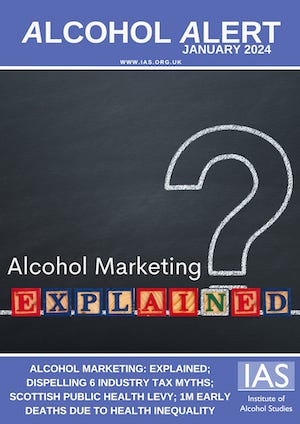
February – Alcohol industry gives its tuppence on reducing the harms it causes
The Health and Social Care Select Committee took evidence from alcohol industry representatives on how to reduce alcohol harm, to the dismay of many public health organisations. Professor Sir Michael Marmot drew attention to the cuts to the Office for Health Improvement and Disparities at a time of rising health inequality.
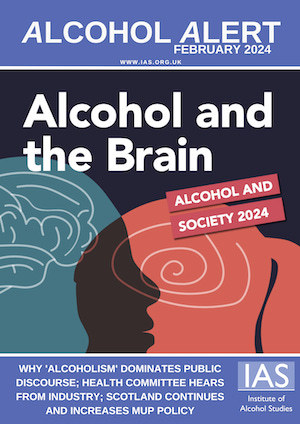
March – Non-alcoholic beer on tap reduces consumption in pubs
A study found that pubs that offered a non-alcoholic beer on draught sold fewer alcoholic drinks, potentially benefiting public health, while losing no revenue due to equal increases in non-alcoholic purchases. In Sheffield, the City Council banned the advertising of unhealthy products including alcohol and fossil fuels.
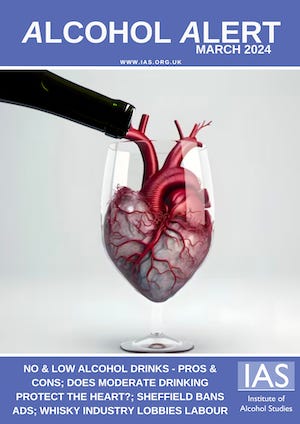
April – Record high alcohol deaths (again)
Alcohol-specific deaths in the UK reached another record high, with a particularly big increase in deaths among women. Meanwhile, the Scottish Parliament voted to continue Minimum Unit Pricing and increase the rate to 65p.
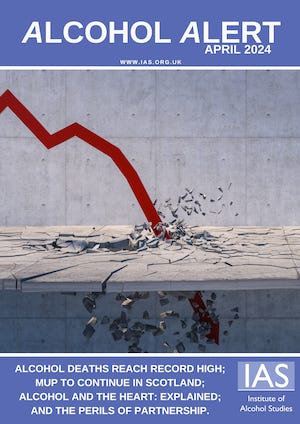
May – Alcohol harm costs society £27.4 billion
A study by IAS found that alcohol harm costs society in England at least £27.4 billion a year, in costs to the NHS, costs due to crime, lost productivity, and to social services. The second session of the Health Select Committee heard from public health experts, as well as the broadcaster Adrian Chiles who said, “drinking makes you boring”.
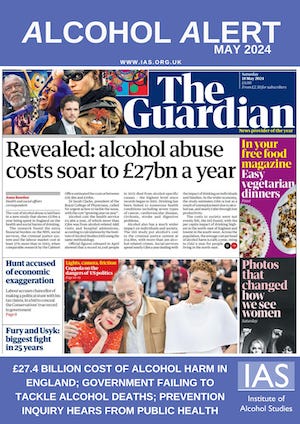
June – BMA calls for a reduction in the drink driving limit
The British Medical Association called for a reduction in the drink driving limit, with the UK (excluding Scotland) being the only country in Europe to have a limit of 80mg of alcohol per 100ml of blood.
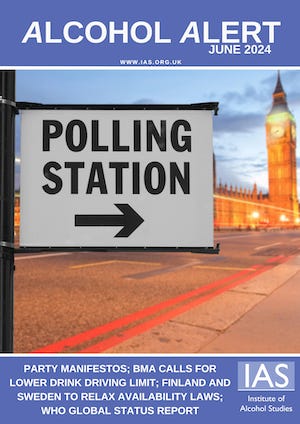
July – Labour wins General Election
Labour won its first General Election in 19 years. Scientific support for alcohol’s health benefits continued to fade, with a number of studies questioning the methodology of previous findings. And drink driving deaths reached their highest level since 2009, a rise of 32% since 2012.
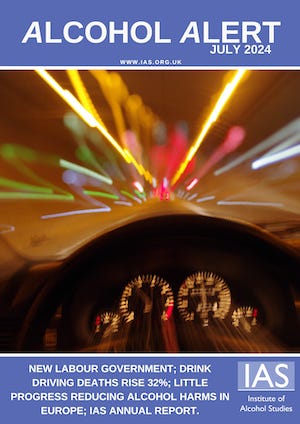
August – The Killer Tactics of the alcohol, tobacco, and junk food industries
Alcohol control advocates issued guidance to the government to keep the alcohol industry at arm’s length. At the same time, an alliance of alcohol, tobacco, and unhealthy food control charities highlighted the common playbook (or ‘Killer Tactics’) these industries adopt to slow or prevent regulation.
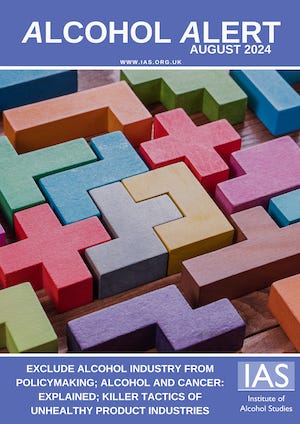
September – NHS in “critical condition”
Lord Darzi’s review said the NHS is “in critical condition” and highlighted that “tough action” on the harms of alcohol succeeded in reducing deaths in the past. A Sheffield University study found that increasing beer and cider tax rates to match other drinks of the same strength could avert 74,000 deaths over a 20 year period.
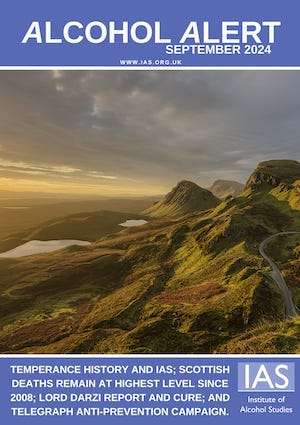
October – Alcohol duty rates kept in line with inflation
Labour’s first Budget since 2010 kept alcohol duty rates in line with inflation. A study found that mobile phone apps developed by alcohol industry-funded groups mislead users, contain misinformation, and may even lead to people drinking more.
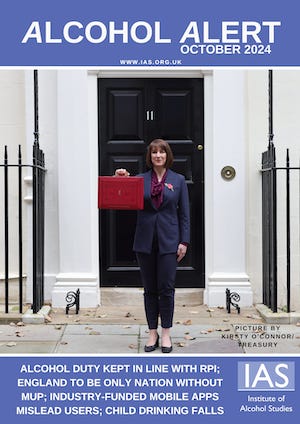
November – A health system response to rising alcohol harm
The Medical Council on Alcohol shone a light on the dire situation regarding alcohol treatment services and the cost-savings of proper investment. The Department for Transport partnered with Heineken for its annual drink driving campaign. And the World Health Organization published its ‘Alcohol Playbook’.

Thank for subscribing to the Alcohol Alert, and we look forward to providing you with more roundups of alcohol research and policy in 2025!

Podcast
Our monthly podcast features interviews with experts from across the sector.
Government licensing reform sparks concerns over public health and local accountability
Professor Niamh Fitzgerald –
University of Stirling
Dr James Nicholls –
University of Stirling

